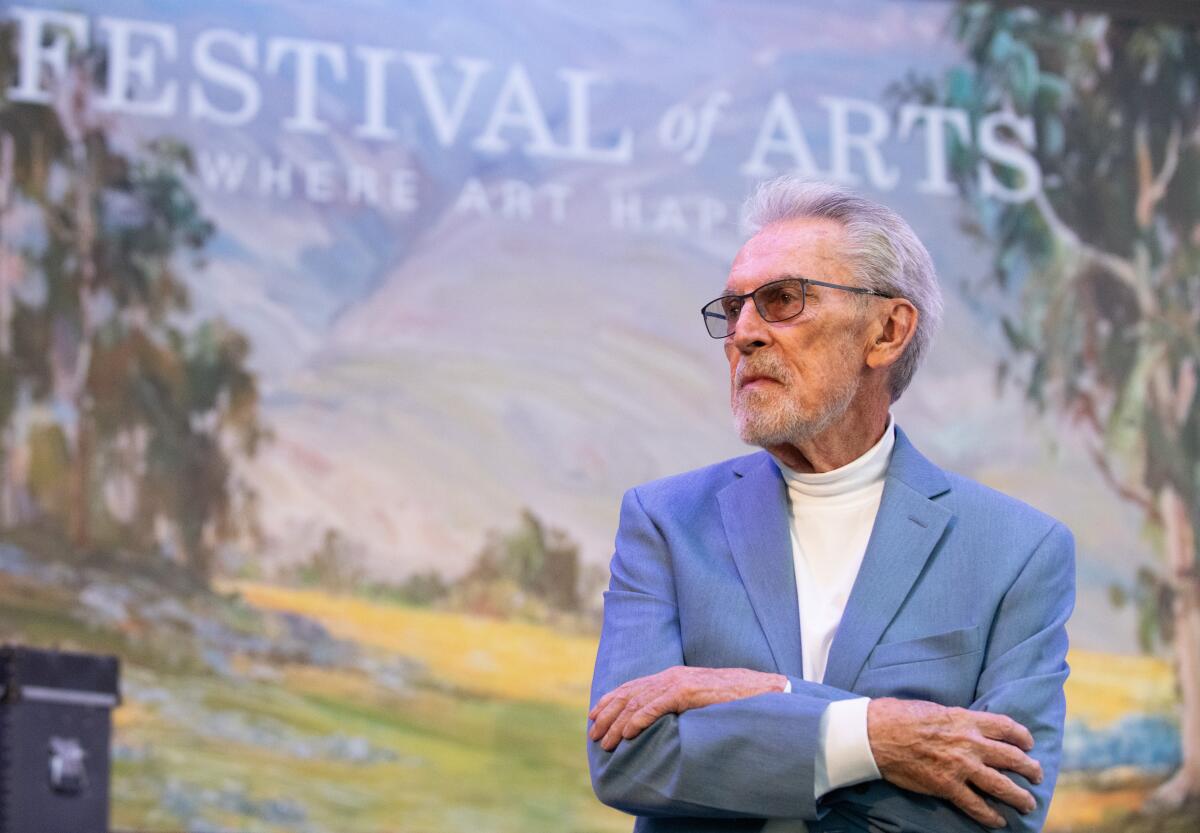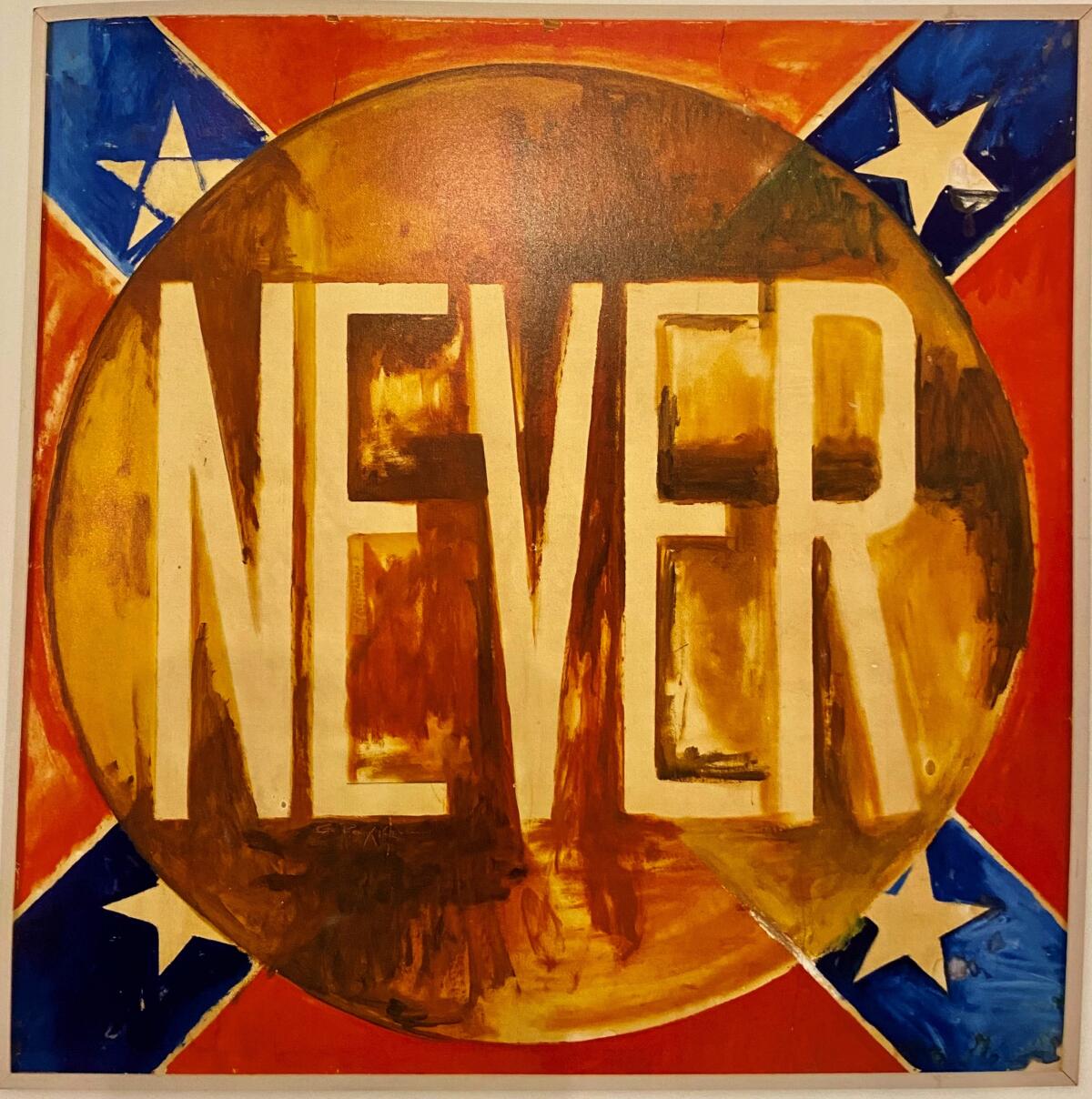Obituary: Artist G. Ray Kerciu led movement to save Laguna Art Museum and won

Laguna Beach artist G. Ray Kerciu — who spoke truth to power in the Civil Rights-era south and helped save the Laguna Art Museum from a takeover in the 1990s — died peacefully in his home Aug. 25 at age 90, according to his wife, Mihae Park.
Those who knew him recalled Kerciu as a passionate activist willing to stand up for his beliefs and skilled at rallying the community to a cause, yet humble enough to step back after a victory and let others lead.
For the record:
10:51 a.m. Sept. 25, 2024An earlier version of this story incorrectly stated Kerciu’s age.
“He was willing to go to battle when something didn’t seem right,” said Julie Perlin Lee, executive director of the Laguna Art Museum. “And when he had the right people in place, he passed the mantle and moved on — he was very much a fixture in our community.”

Kerciu is also remembered as a prolific and versatile creator who worked in many different media including, in later years, an iPad that provided a new canvas for the nonagenarian’s ever-expanding expression.
A celebration of life to honor the artist’s life and work is planned for Sept. 28, from 4 to 6 p.m., at the Laguna Art Museum, located at 307 Cliff Drive.
Barbara McMurray, a neighbor and contributor to the Laguna Beach Independent, interviewed the celebrated artist for a profile coinciding with his 90th birthday on Oct. 24, 2023.
Her piece details a life centered around art, activism and adventure, from his birth in 1933 Detroit to Romanian immigrant parents, to his service in the U.S. Air Force during the Korean War, to his education under the GI bill at Michigan State and, later, the state’s Cranbrook Academy of Art.
“He was always such a positive person, always complimentary and sweet, even though he was this artist who’d done all these things in his life,” McMurray said Tuesday.

While serving as a visiting professor at the University of Mississippi in 1962 — when a Supreme Court ruling allowed Black student James Meredith to attend classes on the segregated campus — Kerciu created works for an exhibition centered around themes of bigotry and racial justice.
One painting, “Never,” features a depiction of a pin worn by segregationists at the time, with Confederacy-inspired stars and bars in the background. “America the Beautiful,” portrayed the same flag covered by racial slurs, McMurray’s story details.
For his so-called desecration of the Confederate flag, Kerciu was imprisoned in what would attract a media frenzy and letters of support from John Steinbeck and Malcolm X, who reportedly told the artist, “Get those Dixie rats!”
After a brief time in New York, Kerciu moved to California and accepted a job at what is now Cal State Fullerton, where he helped grow the university’s art department. He moved to Laguna Beach in 1967, buying a cottage on Crestview Drive that would be his home for nearly 60 years.

Park met Kerciu in the early 1990s, when she enrolled in a stained glass class at Cal State Fullerton with a friend. He was a great teacher and artist who had an unassuming attitude, even about his own accomplishments. The two married on March 25, 1995.
“He was so incredibly loved by everybody,” Park recalled Tuesday. “I think that comes from his having so much grace to meet people where they’re at and not imposing his values or beliefs onto them.”
The artist and sculptor was well known by the mid 1990s, when the board of Laguna Art Museum quietly approved a merger with the Newport Harbor Art Museum, now the Orange County Museum of Art. Concerned for the fate of the institution and its 3,800-piece collection, Kerciu led the Save Laguna Art Museum (SLAM) campaign, which succeeded in disrupting the move.

“It was a big wake-up call and the community responded positively, based on G. Ray’s [advocacy],” Perlin Lee said Wednesday. “It’s incredible to think of all the good things that have come out of the museum since then.”
After the museum’s reincorporation in 1996, Kerciu served as board president but later stepped down, continuing a close affiliation and serving with other organizations as he continued to create works in his home studio. His art appears in collections held by his home museum, as well as the Smithsonian American Art Museum and National Gallery of Art.
In later years, when art making became physically taxing, the artist took to creating digital works on an iPad bought for him by his wife and continued to create.
“All my adult life I was with him,” Park said Tuesday. “I am the person I am because of him — he is woven into my cells.”
All the latest on Orange County from Orange County.
Get our free TimesOC newsletter.
You may occasionally receive promotional content from the Daily Pilot.




